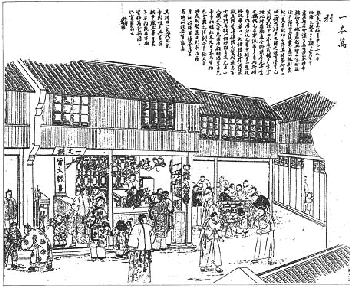
The businesses of salt, tea, wood, and dock shop attracted most Hui merchants. As well, grain, cotton cloth, silk,paper, ink, and porcelain were also popular in Hui-owned shops.
Besides making money by selling those goods, some Hui merchants went outside their hometown and set up factories.
The flexible Hui merchants were apt to adjust their business strategies against the changes in the market. Talents were regarded as an important role in the competition, which unfortunately remained to be neglected by most of the then merchants in other areas in China.
Hui merchants believed sincerely in honesty and morality. Actually, the belief became one of their important means to make profit. They were diligent and famous for their extraordinary endurance. Some left their hometown to seek business chances right after their wedding and could find time to return only some three years later.
Hui merchants were distinctly attached to bureaucracy. Following their success in business, Hui merchants tended to establish close relations with officials to make the business more smooth and prosperous. Some sent their sons to sit inimperial examinations, which provided access to political positions in the government.
